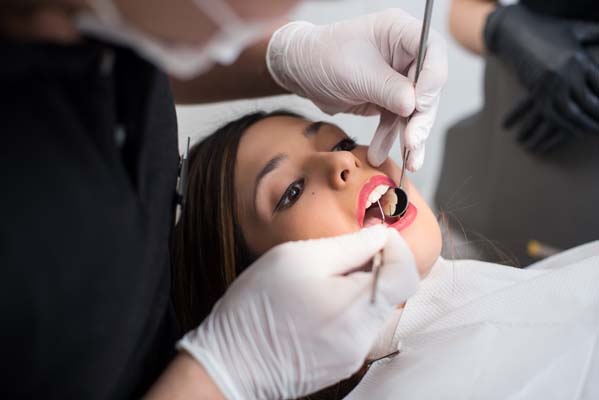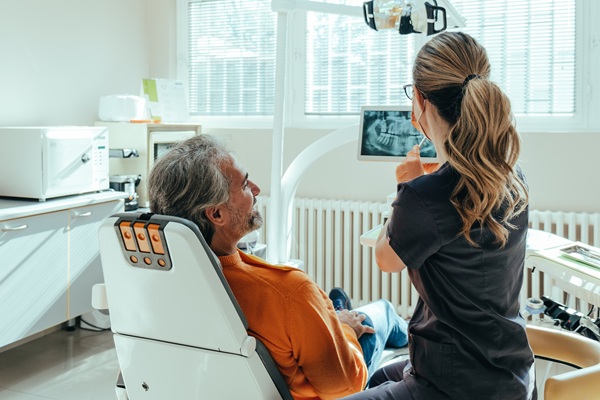General Dentistry Visit and Digital X-rays

Patients are often confused about the need for X-rays during a general dentistry appointment. Digital X-rays give dentists the ability to see what is not visible to the naked eyes. Developing oral issues can be quickly detected and treated, hopefully with less invasive procedures. Continue reading to learn more about the relevance of digital X-rays during a general dentistry visit.
The need for dental X-rays
Dental X-rays are used for taking pictures of the oral cavity with electromagnetic radiation. The X-ray can pass through the soft tissues of the mouth, such as the lips and cheeks, and are absorbed by the hard tissues, like the teeth and bone. Digital sensors measure the level of absorption and produce an image.
X-rays are used mainly to discover cavities, but the dentist can also use them to check other structures of the oral cavity, from the gums to the jawbone and the tooth roots. The dentist can assess the condition of the bone supporting the tooth and detect potential issues that may not be noticeable during a visual examination. A digital X-ray can reveal teeth and jaw positioning and help monitor oral development in younger patients.
The nature of the X-ray used during a general dentistry visit depends on the reason for the appointment. Dental X-rays can serve diagnostic or therapeutic purposes. Therapeutic X-rays are used when patients come in for a routine dental cleaning and checkup. The dentist can see a full picture of the teeth and other structures to identify signs of oral health issues that may need additional evaluation.
The dentist may also take panoramic X-rays with digital radiography to get a comprehensive dental picture. Another common X-ray option is bitewing X-rays, which produce pictures of different parts of the oral cavity.
Diagnostic X-rays serve a slightly different purpose. They are usually required when developing a plan for extensive dental treatments. If root canal therapy is needed, the dentist may recommend a periapical diagnostic X-ray, which takes a full image of the tooth, from the crown to its root. One major advantage of digital X-rays is that the images produced are almost instantaneous; tooth pictures are then displayed on a monitor for a quick examination.
How often are X-rays needed?
Dental X-rays are usually taken once per year. However, many dental professionals only recommend them once every two or three years, except there is a serious oral condition requiring detailed examination. If patients have a healthy oral cavity and have no condition, like gum disease or tooth decay, the general dentist will only suggest taking digital X-rays every once in a while. However, if there are indications of a dental issue, multiple X-rays might be necessary.
Final note
If you are due for a general dentistry visit, you should book an appointment with the dentist. A dental checkup allows the general dentist to monitor your oral health and perform a professional cleaning to prevent the development of oral issues. If you need X-rays, the dentist will explain why.
Request an appointment here: https://www.desalvodental.com or call DeSalvo Dental at (201) 244-7658 for an appointment in our Englewood office.
Check out what others are saying about our dental services on Yelp: General Dentistry in Englewood, NJ.
Recent Posts
In general dentistry, having a tooth extracted can be a lifesaver; however, it can also be quite intimidating to the actual patient. Thankfully, dentistry has improved over the years, which has resulted in better technology and less pain when it comes to extractions and other serious procedures. A common question that arises when discussing tooth extractions…
For the past few years, most communities have been adding fluoride to their water sources at the suggestion of those in general dentistry. Everyone accepted the idea because fluoride is known to prevent tooth decay. Dentists perform fluoridation on the teeth during routine dental checkups. What exactly is fluoride and what are its benefits and…
Choosing the best dentist is essential for maintaining your oral health. However, finding the right dentist for you can feel overwhelming with so many options available. Fortunately, by considering a few key factors and gathering some key information, you can identify a trustworthy dental professional who meets your needs.Convenience plays a significant role in choosing…
While practicing good oral hygiene at home is important, routinely visiting a dental office is essential to maintaining oral health and achieving a confident smile. Whether seeking preventive care, restorative treatments, or cosmetic dental services, understanding what to expect can help make the experience more comfortable and productive. Here are five things patients should know…


